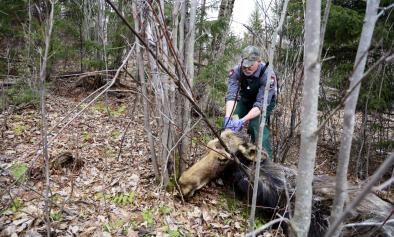Sighting of sperm whales in Arctic a sign of changing ecosystem, say scientists

A rare sighting of sperm whales in the Canadian Arctic is the latest sign of a quickly changing ecosystem, say scientists, as a growing number of species expand their range into warming Arctic waters.
Brandon Laforest, a marine biologist with the World Wildlife Fund, and guide Titus Allooloo were working on a project monitoring the effect of marine traffic on the region’s narwhal population when they spotted the pair of large whales just outside Pond Inlet, a community at the northern tip of Baffin Island in September.
Video of the incident, released at the end of October, captures the second known sighting of sperm whales in the region. In 2014, hunters from Pond Inlet spotted them in the area.
...
While a number of whales species thrive year-round in the Arctic, including beluga, bowhead and narwhal, the physiology of a sperm whale makes it difficult for them to navigate colder waters.
Their heads and upper parts of the body are soft and contain an oily fat – long prized by whalers – that turns waxy in cold waters. Their bodies – which can weigh as much as 125,000lb (56,700kg) – are also ineffective at breaking through ice.
While they don’t represent a threat to the ecosystem, there are worries sperm whale could become trapped as winter approaches.
“Inexperienced whales exploiting a northern habitat may not know to leave early enough before the sea ice forms,” Laforest told the CBC.
...
In recent years, killer whales, or orcas, have also become more frequent in a number, taking advantage of longer ice-free seasons. The whales, which feast on resident narwhal, have even started changing narwhal behaviour, according to a 2017 report by the Department of Fisheries and Oceans.
“I think the narwhal are scared to death,” report co-author Steve Ferguson told the Canadian Press. “Watching your brother or sister or mother get killed and eaten by a killer whale would cause a little post-traumatic stress in most of us.”
Related Content



